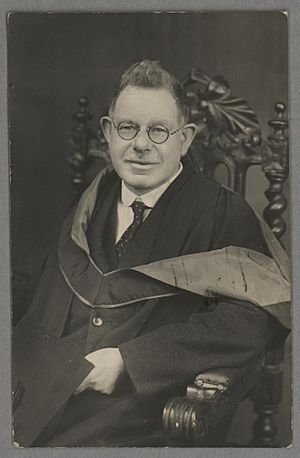John Jenkins (Gwili) facts for kids
John Jenkins (born October 8, 1872 – died May 16, 1936) was a famous Welsh poet and a scholar who studied religion. He was known by his special Welsh name, Gwili. He even became the Archdruid of the National Eisteddfod of Wales, which is a big festival of Welsh culture, from 1932 to 1936.
Contents
Gwili's Early Life and Learning
Gwili was born in a place called Hendy in Carmarthenshire. He was the fifth child of John Jenkins, who worked with metal, and his wife Elizabeth. His parents were very religious Baptists, and Gwili learned a lot at their church's Sunday School. He also went to Hendy Primary School. From 1885 to 1890, he even helped teach younger students there.
Back then, if you were a smart 13-year-old, you could stay at school to help teach. After a few years of learning how to be a teacher, you could take a final test. Gwili didn't become a qualified teacher, but he learned a lot.
In 1891, Gwili went to the Athenaeum School in Llanelli, but it closed after just one term. He then moved to the Gwynfryn School in Ammanford for a year. There, he studied important subjects like Greek and Latin. After that, he went to the Baptists' Theological College in Bangor. He tried to pass an exam for the University of London in 1896 but didn't succeed. This was probably because he spent too much time on his poetry and writing. Because he didn't pass, he couldn't become a Baptist minister right away.
Gwili tried studying at the University of Wales, Cardiff in 1896, but he left a few months later. In 1905, when he was 33, Gwili went to Jesus College, Oxford. He studied "Greats," which included Latin, Greek, old philosophy, and history. He passed his first-year exams. He then changed his course and earned a good degree in theology in 1908.
Later, in 1918, Gwili wrote a special paper about "The Study of the Gospels in Mediaeval Welsh." This helped him get another degree from Oxford University. He also received an honorary degree in 1932, which is a special award given to someone for their achievements.
Gwili's Work Life
Even though Gwili was trained as a minister, he mostly worked as a teacher. Between his studies in Cardiff and Oxford, he taught at Gwynfryn School in Ammanford. After he finished at Oxford, he even became the head of that school. The school closed during the First World War.
In 1917, Gwili started teaching Welsh at Cardiff University. For a while, he even took over as professor when Professor W. J. Gruffydd was away serving in the Royal Navy. In 1919, he became the librarian at Cardiff University's Salisbury Library. Then, in 1923, he became a professor at the Baptist College and University of North Wales in Bangor, where he stayed until he retired.
Gwili also spent time as the editor of a Baptist newspaper called Seren Cymru. He first edited it from 1914 to 1927. During this time, he used the paper to share ideas from groups like the Fabian Society and the Independent Labour Party. These groups believed in making society fairer and helping working people. His work made the paper very important. After he left, the paper became less popular. He was asked to come back as editor in 1933 to help it, and he stayed until he passed away. He also edited another Baptist paper called Seren Gomer from 1930 to 1933.
Gwili the Poet
Gwili's first poem was published in a newspaper in 1887 when he was only 14 years old. He entered many poetry competitions across Wales and won quite a few. He won in places like Llanelli, Cwrt Henri, Dolgellau, Corwen, and Caernarfon.
He wasn't as successful in the big national competitions at first. He tried to win a major prize at least seven times but didn't. Finally, in 1901, he won the Crown at the Merthyr Tydfil National Eisteddfod for his poem "Tywysog Tangnefedd," which means "Prince of Peace."
Gwili knew a lot about cynghanedd, which is a very strict and traditional way of writing Welsh poetry with special rules for sounds and rhymes. However, he usually won awards for his poems written in a freer style. Even so, he was asked to judge competitions for cynghanedd poetry at least twice. In 1931, he was chosen to be the Archdruid, a very important role in Welsh culture, and he served from 1932 until his death in 1936.
Gwili's Family Life
In 1910, Gwili married Mary E Lewis from Ammanford. They had two daughters: Nest, born in 1912, and Gwen, born in 1914.
Gwili passed away on May 16, 1936. The children of Hendy were given a half-day off school to stand along the streets as his funeral procession passed by. He was buried on May 19 at Hen Gapel, Llanedi. His family received over 700 letters and telegrams from people sending their condolences.
Gwili's Books
- Poems (1920)
- Arweiniad i'r Testament Newydd (1929)
- Hanfod Duw a Pherson Crist (1931)
- Caniadau (1934)
 | Misty Copeland |
 | Raven Wilkinson |
 | Debra Austin |
 | Aesha Ash |


